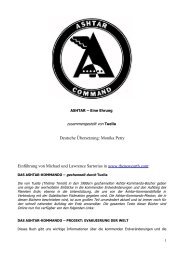ALIEN INTERVIEW - THE NEW EARTH - Earth Changes and The ...
ALIEN INTERVIEW - THE NEW EARTH - Earth Changes and The ...
ALIEN INTERVIEW - THE NEW EARTH - Earth Changes and The ...
Create successful ePaper yourself
Turn your PDF publications into a flip-book with our unique Google optimized e-Paper software.
• Put forth a closed system of logic <strong>and</strong> an authoritarian structure that permits no<br />
feedback <strong>and</strong> refuses to be modified except by leadership approval or executive<br />
order.<br />
o <strong>The</strong> group has a top-down, pyramid structure. <strong>The</strong> leaders must have verbal<br />
ways of never losing.<br />
o Victims are not allowed to question, criticize or complain -- if they do, the<br />
leaders allege that the victim is defective -- not the organization or the<br />
beliefs.<br />
o <strong>The</strong> individual is always wrong -- the system, its leaders <strong>and</strong> its belief are<br />
always right.<br />
o Remolding of the individual victim happens in a closed system. As victims<br />
learn to modify their behavior in order to be accepted in this closed system,<br />
they change -- begin to speak the language -- which serves to further isolate<br />
them from their prior beliefs <strong>and</strong> behaviors."<br />
Social psychology tactics<br />
A contemporary view of mind control sees it as an intensified <strong>and</strong> persistent use of well<br />
researched social psychology principles like compliance, conformity, persuasion,<br />
dissonance, reactance, framing or emotional manipulation.<br />
One of the most notable proponents of such theories is social psychologist Philip Zimbardo,<br />
former president of the American Psychological Association:<br />
"I conceive of mind control as a phenomena encompassing all the ways in<br />
which personal, social <strong>and</strong> institutional forces are exerted to induce<br />
compliance, conformity, belief, attitude, <strong>and</strong> value change in others.<br />
"Mind control is the process by which individual or collective freedom of<br />
choice <strong>and</strong> action is compromised by agents or agencies that modify or<br />
distort perception, motivation, affect, cognition <strong>and</strong>/or behavioral outcomes. It<br />
is neither magical nor mystical, but a process that involves a set of basic<br />
social psychological principles."<br />
In Influence, Science <strong>and</strong> Practice, social psychologist Robert Cialdini argues that mind<br />
control is possible through the covert exploitation of the unconscious rules that<br />
underlie <strong>and</strong> facilitate healthy human social interactions. He states that common social rules<br />
can be used to prey upon the unwary, <strong>and</strong> he titles them as follows:<br />
• "Reciprocation: <strong>The</strong> Old Give <strong>and</strong> Take...<strong>and</strong> Take"<br />
• "Commitment <strong>and</strong> Consistency: Hobgoblins of the Mind"<br />
• "Social Proof: Truths Are Us"<br />
• "Liking: <strong>The</strong> Friendly Thief"<br />
• "Authority: Directed Deference"<br />
• "Scarcity: <strong>The</strong> Rule of the Few"<br />
Using these six broad categories, he offers specific examples of both mild <strong>and</strong> extreme mind<br />
control (both one on one <strong>and</strong> in groups), notes the conditions under which each social rule is<br />
most easily exploited for false ends, <strong>and</strong> offers suggestions on how to resist such methods."<br />
Reference: Wikipedia.org<br />
210





